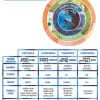The period of counting the omer is drawing to a close. It’s one of the many times that Jewish tradition uses cycles of seven to encourage a balance of work and rest. The most famous, by far, is shabbat itself. I love that the Italian word for Saturday is “sabato.” One of the online Italian-English dictionaries has this: “Saturday is considered the last day of the week in some countries.” By “some countries” I think they mean the State of Israel. It was the Jewish Sabbath, on Saturday, that first marked the day of rest, and as Christianity and then Islam spread across the world, shabbat moved to Sunday or Friday. The lexicographical evidence of its origins has its own charm. I think it’s impossible for most of us to understand how radical the idea of shabbat must have been. We grow up with two-day weekends (a day and a half in Israel, depending on your age), plus public holidays, school vacations, summer vacations, parental leave, disability. None of these existed in the first 100,000 years of biological humanity. Each of them has undergone the arc of a new idea: introduced by someone; considered crazy, ridiculous, impossible; gradually people argued […]





